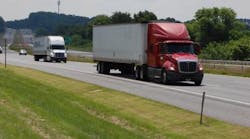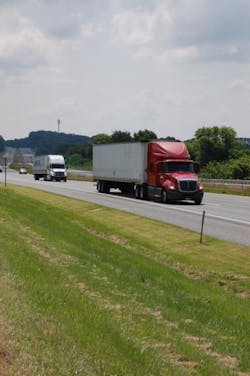Those are not comforting thoughts at all and are just a few of the somewhat unsettling findings revealed in the firm’s 2015 Planning & Progress Study.
Another suggests that “poor communication” may be a contributing factor to delaying retirement involuntarily as four in 10 of the 5,474 American adults aged 18 or older participating in Northwestern Mutual’s online survey in January said they haven’t discussed retirement with anyone while a full third (35%) do not have any sense of how much income they will need to retire.
"With life expectancy increasing, planning for retirement is essentially like preparing for a vacation that could last decades," noted Rebekah Barsch, VP of planning at Northwestern Mutual, in a statement.
Yet that “vacation” is going to require a good bit of funding – especially if it lasts for decades. So could piloting a truck during that “vacation” period help provide some of that needed monetary backing?
It could be a “win-win” in a way for both parties here – older Americans and the trucking industry – as the dearth of younger workers and their lack of enthusiasm for driving, much less driving trucks for a living, becomes more readily apparent.
Here are a few other factors at work: When looking toward retirement, only 12% of future retirees envision being completely out from the work force, Northwestern Mutual found in its poll – contrasting significantly with current retirees, nearly four in five of whom report being completely retired.
And regardless of lifestyle expectations, adults who are not yet retired are substantially less optimistic about their retirement prospects than current retirees, the insurance firm found:
- Only 68% of future retirees expect to be happy in retirement compared to 80% of current retirees;
- 61% of current retirees say they have maintained their quality of life in retirement while only 52% of future retirees expect to;
- Only half (54%) of future retirees believe they will be able to focus on activities such as health and fitness relative to three quarters (74%) of current retirees.
This somewhat pessimistic outlook may again stem from shortfalls in financial planning as Northwestern Mutual’s survey data revealed that, as compared to "informal planners," adults who consider themselves "highly disciplined" or "disciplined" planners are significantly more likely to be happier before and during retirement and better equipped to manage unexpected situations.
Yet there are other more positive factors at work, too. According to the insurance company’s poll, nearly 40% of future retirees are planning to work longer by choice for these top three:
- Enjoy job/career (66%)
- Want additional disposable income (60%)
- Seek social outlet to stay active and prevent boredom (49%)
Interestingly, it is Millennials (aged 18 to 34) and Matures (aged 69 and over) – two generations at the extreme ends of the career lifecycle – that are the most enthusiastic about the prospect of continuing to work.
Can trucking successfully tap into those trends to help fill its vacant driver seats? Time will only tell.




